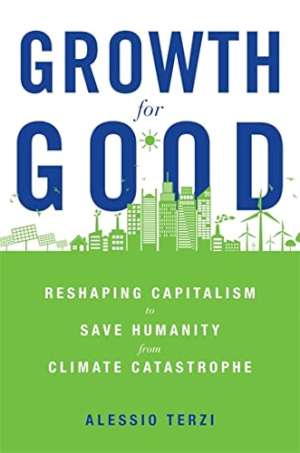25 July 2022
Growth for Good
Alessio Terzi
2022, Harvard University Press, 345 pages,
ISBN 9780674258426
Reviewer: Ian Bright

A comment by the host of a dinner party in Rome in 2007 was the genesis of this book. Alessio Terzi, was a guest at the party and beginning his undergraduate studies in economics. Conversation had turned to the economic situation in Italy. Terzi had suggested structural reforms to increase growth. Giorgio, his host, suggested otherwise. “We need to stop growing! As my friend Serge always says, we need to degrowth.” (p. ix) The host was referring to the work of French intellectual Serge Latouche, one of the masterminds of the decroissance, or degrowth, movement.
This remark obviously struck the undergraduate economist as, 15 years later, Alessio Terzi has written a book debunking the degrowth movement. Mr Terzi is now an economist at the European Commission’s Directorate-General for Economic and Financial Affairs and has held posts at the think tank Bruegel and was an Affiliate Fellow at the Harvard Kennedy Business School. The book is detailed, with extensive footnotes and copious references, yet reads easily.
The book takes aim at idealistic approaches to the way societies organise themselves, particularly in relation to the immediate need to address climate change. Late in the book, Mr Terzi summarises his criticism of degrowth approaches as follows:
“Indeed, books on climate change and the future economy have a very strong tendency to take a normative stance. Authors in this genre get easily carried away by idealistic future predictions, based on their own aspirations, rather than sticking to impersonal analyses of social facts – and typically adopt a moral angle, enrolling the climate crisis to advocate a broader, pre-existing, worldview or ideology. Many view the need to reshape capitalism to address climate change as an occasion to fix all past wrongdoings, such as global and local inequality, colonialism, patriarchy, racism and even conspicuous consumption. This tendency is not confined to eco-socialist, post-growth visionaries. It is shared across the spectrum, all the way to green growth advocates.” (p. 155)
Mr Terzi prefers a more practical approach. The book “focuses more on what is likely to happen and to be feasible than on what would be ideal or desirable based on a particular moral compass. Climate change alone will be a colossal challenge, and adding extra layers of complexity will hardly make it easier to address – so conversations about the future of capitalism in light of climate change could benefit from some realpolitik.” (p. 155)
Mr Terzi notes that the current degrowth movement is nothing new. He cites its roots going back to the primitivism school of thought in the eighteenth century about the time of the industrial revolution (see pp. 45-46). Degrowth movements would hinder progress and innovation despite people and societies wanting progress and innovation. These approaches would also be “…incompatible with personal freedom as liberal democratic societies have always defined it.” (p. 58).
The arguments presented against slow/ zero/ de-growth are similar to those made By Branko Milanovic in his review of Kate Raworth’s 2017 book “Doughnut Economics”.
Mr Terzi argues that allowing the innovative tendencies of capitalist systems to flourish is the best way to address many of the problems societies face, especially when it comes to climate change. It is here that Mr Terzi may be on less firm ground. Chapter eight purports to present a blueprint for green capitalism, yet it is difficult to discern a plan, rather than six principles for guiding the actions of governments, international coordination and business.
This fits with the observation of the book that global, regional and national economic systems are complex. Given this complexity, guidance can work better than intervention. Here, I feel that Mr Terzi underplays the need for urgent and possibly radical guidance and incentives by governments. Despite the criticism of Mariana Mazzucato’s work (see pp. 66 and 67 and also this from John Kay), the risks associated with climate change are such that more active intervention and regulatory incentives may be necessary. As I understand it, this is also the position of Lonergan and Sawyers in their book Supercharge Me.
Mr Terzi is also too forgiving of economics and the economics profession for its slowness to act on climate change and also of the role of businesses in attempting to undermine the science of climate change (see p.138). Lord Stern (see, for example, this 2021 lecture) is rightly critical of not only the slowness of economists to respond to climate change but also of the models and thought processes they use to assess the problem. He calls for a change in economics to recognise this. Lord Stern argues for more activism than Mr Terzi appears to suggest. I’m on the side of his Lordship.
